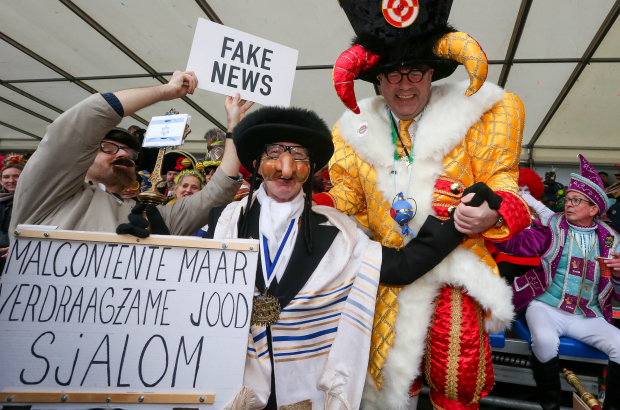- Daily & Weekly newsletters
- Buy & download The Bulletin
- Comment on our articles
One year on, investigation into controversial Aalst Carnival continues
An investigation into offensive representations of Jews on show at last year’s Aalst carnival is still ongoing, prompting anger and consternation among the anti-discrimination groups which submitted the original reports 12 months ago.
During the carnival on 23 February 2020, several performances which angered the Jewish community were reported by Unia, the inter-federal centre against discrimination, to the prosecutor's office in Dendermonde.
Caricatures of Jewish people with hooked noses and the bodies of ants, dressed in Hasidic clothes, paraded along the streets not far behind fake gestapo officers and marionettes wearing the Star of David who closed their eyes, held their mouths and plugged their ears.
Joel Rubinfeld of the LBCA, Belgian League Against Anti-Semitism, who attended the carnival in Aalst in 2020, called the investigation a "big mess".
The carnival of Aalst, whose origin dates back to the 15th century, is no stranger to controversy and polemics, especially in connection with the Jewish community. In 2013, the organisers were forced to loudly defend their right to total freedom of expression and satire after one carnival float, designed to look like a train similar to those which transported deported Jews during the Second World War, travelled the carnival route beside SS officers carrying cans of Zyklon B, the gas used in death camps.
In February 2019, a float carrying people dressed as Jews with hooked noses, sitting on mountains of gold, was denounced by several associations including the Coordinating Committee of Jewish Organisations of Belgium (CCOJB) and the Forum of Jewish Organisations (FJO). In addition, revellers also paraded in uniforms of members of the American white supremacist movement, the Klu Klux Klan.
The outcry surrounding the 2019 event led to the European Commission strongly condemn the offending carnival exhibits and called on Belgium to "take the necessary measures." The town’s Flemish nationalist mayor, Christoph D'Haese, rejected all calls for sanctions against Aalst’s carnival and defended it from censure.
In response to provocation from D'Haese, Unesco withdrew its official recognition of the carnival which it had held since 2010, stating that the event no longer met certain criteria because it broadcasted messages "ridiculing certain groups," "insulting memories of painful historical experiences" and promoting "hurtful representations".
Despite previous controversies and the beginning of the coronavirus outbreak in Europe, the 2020 edition went ahead – despite calls for it to be cancelled by the government of Israel. As is tradition, the carnival was used as a way of satirically addressing the furore surrounding its previous edition, with the stereotypical Jewish caricatures taking prominence and references to UNESCO’s perceived appeasement towards the Jewish lobby.
"The withdrawal of recognition by Unesco provoked a strong reaction,” said Joel Rubinfeld of the LBCA on Tuesday. “There was a revanchist feeling, a form of impunity with the political support of the mayor of Aalst. In 2019, only one float was problematic. In 2020, I saw seven or eight."
"Yes, we can laugh at the Jews,” he continued. “But we can't incite hatred of Jews. However, this is what happened in Aalst a year ago. Unfortunately, of the 140 good-natured floats and revellers, only those who incited hatred will be remembered. Why these clichés? Why add hooked noses, silver, gold bars and Jews made to look like ants or rats? Some people in Aalst do not realise what they are doing, despite the reactions, the warnings, the media coverage... And behind that is the overwhelming responsibility of a mayor. History will remember that he authorised these multiple anti-Semitic offences without the slightest regret."
Sophie Wilmès, who was Belgian prime minister at the time of the 2020 event, condemned the carnival and its use of "stereotypes, references stigmatising communities, and human groups on the basis of their origins" that lead to "divisions" and "endanger living together". Philippe Close, the mayor of Brussels, accused the carnival of promoting a "calamitous image of Belgium and Flanders."
After the 2020 carnival, Unia received more than 27 reports and forwarded them to the prosecutor's office in Dendermonde, which then decided to open an investigation. The CCOJB decided at the time not to press charges – a decision it would later regret.
This year’s carnival in Aalst was scheduled for 14 February but did not take place because of the coronavirus crisis. The next one will start in 368 days, from 27 February to 1 March 2022. Whether the investigation will be any closer to a conclusion by either of these dates remains to be seen.


















